
The term “trigger” has been a hot topic recently. Take the debate over trigger warnings in academia, alerting students of content that could be harmful to those with mental illnesses. Passion about the issue, combined with a contentious political atmosphere, has made finding the facts difficult.
Despite the topic’s popularity, triggers have been around in psychology for a very long time. Today, we’re going to examine triggers and what defines them, in the hopes of clearing the fog.
Understanding PTSD, Anxiety, and Other Illnesses
A trigger is any phrase, object, or situation that can activate the symptoms of a mental illness. Typically, this is in relation to post-traumatic stress disorder, or PTSD. PTSD sufferers experience a fight-or-flight, fearful, or dreadful response linked to a previous traumatic experience. The condition is most known for its occurrence in the military, with around 10-20 percent of active duty personnel experiencing it.
However, PTSD can occur after many other traumas. Some of them are obvious, such as sexual assault or a car accident, and some may be from less abrupt trauma, such as repeated verbal abuse or a tumultuous home life.
Other mental illnesses can also have triggers. Generalized anxiety disorder, depression, and other mental illnesses can all be tied to triggers. Further conflating things, anxiety and depression may be genetic, needing no defining trauma to surface.
Understanding Triggers
The depth and complexity of trigger warnings can be difficult to understand. Part of this misunderstanding can be due to the phrase “trigger warning” and its usage on the internet, particularly among millennials and younger people. Sometimes, the trigger warning may be a specific topic or even a single word.
The confusion is heightened by the association of triggers with PTSD, and therefore with the military. Naturally, it’s easy to contrast a young person’s request for a “trigger warning” with the horrifying flashbacks of military-induced PTSD. In a contest of horrors, the winner may be clear, but it doesn’t necessarily negate the lesser. The reality is that everyone fights their own monsters, and the beasts can be varied and complex.
If you have suffered trauma or believe you may have a mental illness, you should seek diagnosis and advice from a qualified professional. 3-C Family Services can help start your journey to recovery. Contact us today!



